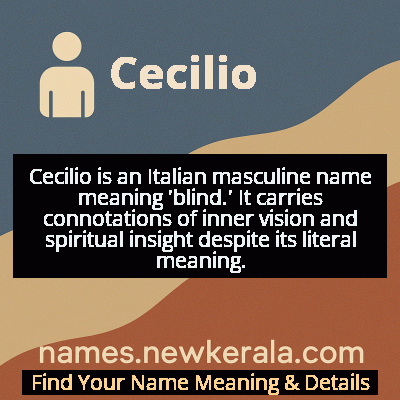Cecilio Name Meaning & Details
Origin, Popularity, Numerology Analysis & Name Meaning of Cecilio
Discover the origin, meaning, and cultural significance of the name CECILIO. Delve into its historical roots and explore the lasting impact it has had on communities and traditions.
Name
Cecilio
Gender
Male
Origin
Italian
Lucky Number
2
Meaning of the Name - Cecilio
Cecilio is an Italian masculine name meaning 'blind.' It carries connotations of inner vision and spiritual insight despite its literal meaning.
Cecilio - Complete Numerology Analysis
Your Numerology Number
Based on Pythagorean Numerology System
Ruling Planet
Moon
Positive Nature
Diplomatic, friendly, artistic, empathetic.
Negative Traits
Over-sensitive, moody, indecisive, prone to self-pity.
Lucky Colours
Green, cream, white.
Lucky Days
Monday.
Lucky Stones
Pearl, moonstone.
Harmony Numbers
1, 3, 4.
Best Suited Professions
Diplomats, mediators, caregivers, artists.
What People Like About You
Cooperative spirit, friendliness, artistic talent.
Famous People Named Cecilio
Cecilio Apóstol
Poet and Journalist
Filipino poet known for his patriotic Spanish-language poems during the Philippine Revolution
Cecilio Guzmán de Rojas
Painter
Bolivian painter renowned for his indigenist works and founding the National Academy of Fine Arts
Cecilio Valdés
Baseball Player
Cuban baseball star who played in the Cuban League and Mexican League during the 1940s-1950s
Cecilio Costilla
Revolutionary Leader
Mexican insurgent leader during the Mexican War of Independence
Name Variations & International Equivalents
Click on blue names to explore their detailed meanings. Gray names with will be available soon.
Cultural & Historical Significance
In Spanish-speaking regions, Cecilio became particularly prominent in the 19th century, often chosen by families seeking to honor their classical heritage while maintaining a distinctly Hispanic identity. The name appears frequently in Latin American literature and history, representing both intellectual refinement and connection to European cultural roots. In the Philippines, which was under Spanish colonial rule for centuries, Cecilio became integrated into local naming traditions while retaining its European character. The name's persistence across centuries and continents demonstrates its enduring appeal as a bridge between classical antiquity and modern cultural identity.
Extended Personality Analysis
Individuals named Cecilio are often perceived as thoughtful, introspective, and possessing deep intellectual curiosity. They tend to be analytical thinkers who approach life with careful consideration rather than impulsive action. This name is associated with people who have strong observational skills and the ability to see beyond surface appearances, perhaps ironically given the name's meaning of 'blind.' Cecilios are typically patient, methodical, and excel in fields requiring attention to detail and sustained focus. They often demonstrate remarkable resilience and the ability to overcome challenges through perseverance rather than brute force.
Many Cecilios develop strong intuitive abilities and emotional intelligence, making them excellent counselors, mentors, or creative professionals. Their quiet confidence and reliability often make them trusted friends and valued colleagues who others turn to for wise counsel. While they may appear reserved initially, Cecilios typically form deep, lasting relationships built on mutual respect and understanding. They often possess a dry wit and subtle humor that reveals itself gradually. The name suggests someone who values tradition and stability but also has the capacity for innovative thinking when circumstances require fresh perspectives.
Modern Usage & Popularity
In contemporary times, Cecilio maintains a presence as a classic but relatively uncommon choice in Italian and Spanish-speaking communities. The name has experienced a slight resurgence in recent years as parents seek traditional names with historical depth that stand out from more popular choices. In Italy, it ranks outside the top 200 names but maintains steady usage, particularly in southern regions and among families with strong classical education backgrounds. Among Hispanic communities, Cecilio enjoys moderate popularity in countries like Mexico, Argentina, and Spain, where it's often chosen to honor family traditions. The name's sophisticated, slightly formal quality makes it appealing to parents looking for a name that conveys intelligence and heritage without being overly common. Digital name databases show increasing search interest in Cecilio as part of the vintage name revival trend, though it remains far less common than similar classical names like Marco or Alessandro.
Symbolic & Spiritual Meanings
Symbolically, Cecilio represents the paradox of vision beyond physical sight - the ability to perceive truth through intuition, wisdom, and inner vision rather than mere physical observation. The name embodies the concept of insight prevailing over eyesight, suggesting that true understanding comes from deeper perception. In metaphorical terms, Cecilio symbolizes the journey from darkness to enlightenment, representing spiritual awakening and the development of inner wisdom. The name carries connotations of perseverance through adversity, as overcoming the literal meaning of 'blindness' suggests triumph over limitations. It also represents the value of contemplation and the idea that some truths can only be grasped when one looks beyond surface appearances. In artistic and literary contexts, Cecilio often symbolizes the visionary who sees what others cannot, the wise elder who understands life's deeper meanings, or the artist who captures essential truths that escape ordinary observation.

